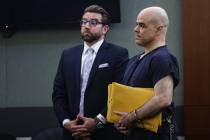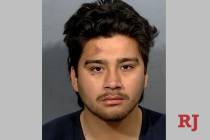Former members of Use of Force Review Board call it rubber stamp
Former University of Nevada, Reno basketball star Charles Bush had his share of problems — drugs, a prostitute girlfriend and more than $5,500 in debt to the IRS — but until July 31, 1990, he had largely kept out of trouble with the law.
That night, as the casino floorman slept in the seedy residential motel room he shared with his girlfriend, three men gathered around his bed. One gave it a kick. In the ensuing fight he was choked to death.
The man who killed him was Las Vegas police Detective Gerald Amerson, who with two other plainclothes cops had entered the room without a warrant and without announcing themselves as police.
In Las Vegas, a transient town that struggles to muster outrage over anything, the circumstances of the death of a black man who was not involved in a crime — in his own home — at the hands of three white cops set off a firestorm.
More than 600 people rallied after a Clark County coroner's inquest cleared the officers. Hundreds protested on the Strip — "Welcome to Las Vegas. Visit exciting casinos. Win lots of money. Meet the local police and be murdered by them," one sign read.
When Clark County District Attorney Rex Bell declined to charge the detectives, Nevada Attorney General Frankie Sue Del Papa took the extraordinary step of charging all three with involuntary manslaughter. They were eventually acquitted by a hung jury, and Bush's family received a $1.1 million settlement.
To quell community outrage, Clark County Sheriff John Moran made his own extraordinary move. He created an internal review board to look at each incident where a Las Vegas cop uses deadly force. The board, five officers and two civilians, would recommend not only discipline for errant officers but also changes in training and policy.
That Use of Force Review Board was considered a seminal step in allowing the public more information about and influence over department operations. Then, as now, it is seen as the linchpin of the Metropolitan Police Department's efforts to police itself.
But those who know the board best say it has never been more than a rubber stamp for a department that avoids facing its problems and is slow to address embarrassing errors.
"It's just a crock," said Barbara Kowalczyk, who moved to Las Vegas after retiring from the Detroit Police Department and served as a review board civilian member from 2004 to 2008. "They try to make you think that they are doing something, but it's a crock."
Officers have appeared before the board 510 times, as of May. Department records show the board ruled in favor of the officer 497 times — a 97 percent clearance rate.
Not once has the board ruled against an officer in a fatal shooting.
Former Undersheriff Rod Jett, a Las Vegas cop for more than 30 years until he retired as second-in-command last year, said the board was created with good intentions but no longer functions as it should.
Jett said rulings adverse to the officer are so rare that either "every officer that walks to the board has done everything perfectly, or the board has lost its ability to be independent and come to independent conclusions about the use of force."
"In my opinion, the board lost its ability to objectively look at the facts of the case, even with civilians on the board, because civilians who would question whether or not an officer's actions were appropriate were often challenged or told they didn't have the expertise to even have an opinion," Jett said. "And also during those periods when we had commissioned officers on the board who had the character and the courage to raise issues as to whether or not the actions of the officer were appropriate, those individual officers were attacked."
DEADLY FORCE PROMPTS REVIEWS
Las Vegas police officers who use deadly force in the line of duty can face one or two reviews of their actions, depending on the incident's outcome.
If there's a death, homicide detectives investigate and the case is presented at a public coroner's inquest. Until recently, citizen jurors determined if the officer's actions were justified, excusable or criminal.
Inquests have been suspended for more than a year, however, because of a pending legal challenge brought by officers who object to last year's overhaul of the process by the Clark County Commission.
The department's Review Board also looks at fatal shooting cases to see if the officer violated policy, but it has never disagreed with an inquest jury.
When a shooting isn't fatal, it's investigated by homicide detectives and reviewed only by the Review Board.
For every shooting aired in a public inquest, two go only to the Review Board.
Review Board meetings are not open to the public. Rulings aren't announced, and the response to inquiries is limited to a curt word or two usually indicating that the complaint was unfounded or use of force was justified. Any disciplinary action recommended by the board is deemed a confidential personnel matter. Former Review Board members describe a system so weighted in favor of the officers and so intent on smoothing over problems that even legitimate inquiries that might lead to more effective police procedures and improve officer safety are routinely squelched.
Kowalczyk recounts one hearing after a man was shot because he grabbed for an officer's holstered pistol. She said she asked if the department uses holsters that have locking mechanisms and was cut short by officer-members who didn't want to discuss it.
REVIEW BOARD CRITICISM UNCOMMON
When it comes to use of deadly force, the Review Board seldom finds anything to criticize.
In January 2010, for example, officer Tylor Dominguez pulled over a sport utility vehicle at Las Verdes Street and La Pasada Avenue in the central valley after a reported kidnap attempt. Stopping his patrol car facing the SUV, he got out and unholstered his gun.
But he forgot to shift the car into park. It started driving away, and in the chaos Dominguez's gun went off.
An observer in a police helicopter watched the scene unfold and later said Dominguez jerked his gun hand like he was "spooked." In his report, the investigating detective wrote the people in the SUV "were like, 'What is going on.'"
The bullet went through the wall of a nearby home, shattering a mirrored closet door. Three people in the house were in another room and were unhurt. The patrol car came to rest against a stop sign.
Las Vegas officers are expected to notify dispatchers if they fire a weapon. Dominguez instead used a cellphone to tell his sergeant he'd crashed his car and had "squeezed off a round."
Because Dominguez didn't call dispatchers, the sergeant assumed the shot was an accidental discharge with no injuries, which doesn't require detectives to investigate. But when the sergeant arrived at the scene, Dominguez said he fired because he saw someone in the SUV reach down, perhaps for a weapon. The sergeant told investigators he didn't believe Dominguez's second version of events. No weapon was found in the SUV, and no one was arrested.
Although fellow officers expressed doubts about Dominguez's account, the Review Board cleared him. He left the force a few months later.
In another, much higher-profile case last year, the board found that Detective Bryan Yant was justified in killing small-time marijuana dealer Trevon Cole during a botched apartment raid.
Cole, 21, was unarmed and crouching in a darkened bathroom, trying to flush his stash when Yant shot him. The detective said Cole made a threatening movement toward him, but the county's own experts testified at inquest that forensic evidence contradicted his story. Yant remains on the force.
The board also said Sgt. Darrin Densley was justified when he nearly killed Leonard Greer Jan. 12 at a central valley apartment complex where Greer, 22, was getting into his car with some friends.
Densley, engaged in a never-explained "police activity," shouted at Greer to stop. Greer said he never heard the commands and looked up from his driver's seat to discover the cop's gun in his face. Greer said he was asked to prove he lived in the complex, told Densely he had a rent receipt and reached for it after the officer told him to do so.
For reasons never publicly explained, Densley fired his pistol mere inches from Greer's head. Both the young man and the cop were lucky that night. The door window was rolled up, and it deflected the bullet. Police cited the badly shaken but otherwise unharmed Greer with obstructing a police officer. The charge was quickly dismissed.
CITIZEN MEMBERS FAULT BOARD
While the Use of Force Review Board was initially seen as a move toward openness and accountability, citizen members soon discovered problems. And in some cases, the citizens were the problem.
The board was created in part to spotlight trends and recommend policy changes, but an early citizen member said opposing ideas were quickly dismissed.
John Ponticello said he voiced concerns over a 1991 incident where a man answered his door with a gun and was quickly shot and killed by two officers who had not identified themselves.
"I said, 'That's not right,'" said Ponticello, a board member throughout the 1990s. "You don't go banging on the door without announcing (yourself)."
But the cops on the board only defended the practice of not always identifying themselves. The issue was dropped and the officers were cleared of wrongdoing.
Citizen member Will Watson, who served from 1991 to 1993, said he had concerns when officers were allowed to sit next to each other and listen to each others' testimony during hearings.
"It seemed to be skewed in favor of police," he said.
Edward Ochoa, a citizen member from 1991 to 1993, said he was disturbed by arbitrary procedures. In a 1992 shooting review, board members were told that they had to reach consensus, he said. But after he voted to admonish the officer, the board was quickly dismissed without ever reaching a verdict. Official records, however, show the officer was cleared. The case was the second of three controversial killings by officer George "Gregg" Pease.
"I left questioning the whole process," Ochoa said.
More recent board members say little has changed.
Kowalczyk said that when the board reviewed the controversial 2006 killing of 17-year-old murder suspect Swuave Lopez, who was shot while handcuffed and running away, she was upset that it dwelled more on Lopez's crimes than on his death. Not that she's a bleeding heart. She was involved in a fatal gunbattle herself while on the job in Detroit.
Robert Kainen, who served from 2004 to 2008, said shooting investigations weren't thorough enough.
"You're not presented with any other side, other than the report from the police officers, and my feeling from reading the reports was that the questions from the detectives were made in such a way to produce a kind of response that would be the most positive for the police department," Kainen said. "There were no lies, as far as I could tell, but the questions weren't as probing as I thought they could be."
PRO-POLICE BIAS EMERGES
Any citizen can apply for a seat on the board, and the sheriff makes the appointments. While it started with five officers of different ranks and two citizens, over time it has shifted to its current configuration of four citizens and three cops.
That, however, hasn't meant a more critical eye on department actions.
Former Deputy Chief John Sullivan, who helped set up and initially supervised the board, said he recommended giving more seats to citizens in response to complaints the board was too dominated by police. Altering the mix would quell criticism without changing the outcome, he assured the sheriff.
"Sure enough, there was no difference," Sullivan said.
If anything, cops on the board are far more likely to be critical, he said.
"They (citizen members) were very sympathetic with the officer," Sullivan said, adding that they would often make comments like, "You couldn't pay me enough to do that job."
Sullivan said that he sometimes disagreed with the citizen-heavy board's lenient decisions, and expressed his opinion to Moran, only to be told, "I'm not going to go against them."
Little has changed in two decades.
Kowalczyk, the former Detroit cop, said her fellow citizen board members often talked about family members in law enforcement and were overwhelmingly pro-police.
SHERIFFS DEFER TO BOARD
Sheriff Doug Gillespie acknowledges the board's weaknesses and said he is looking at alternatives.
"My challenge with the use of force board, and this has been for a while, is the fact they are hesitant to administer discipline when they find officers in violation of policy," he said. "We've got to find a fix to that."
Former Sheriff Bill Young found he disagreed with the board's findings "many times."
Board decisions are only advisory, but Young does not remember ever overturning one. He said the fact that he personally disagreed with the officer's actions was not enough.
"Once you start putting your personal opinion in it ... you've lost your effectiveness as the sheriff, in my opinion," he said. What he and other sheriffs did was relegate some officers to desk duty, Young said.
Gillespie said he is gathering community feedback on how to change the board and that reducing the number of citizens is possible.
"I think when it comes down to it, citizens in general have a hard time telling a police officer they did something inappropriately under these circumstances," he said.
Other departments also have review boards, but with varying layers of oversight and civilian membership. Denver has an independent monitor who participates in board deliberations and discloses the results to the public in quarterly reports. That city's review board also has the ability to refer concerns about an officer's tactical decisions to a separate Tactics Review Board made up of department experts.
Las Vegas' relatively new Critical Incident Review Team, which studies tactics and policy violations after shootings, last year started presenting cases to the review board, with an emphasis on addressing those issues. Previously, homicide detectives made those presentations, though they're not experts on tactical issues.
Gillespie said the process is improved, and that he's not opposed to further changes that would get his department to a place where "the community feels as if we are being as transparent as we need to be."
Review-Journal reporter Brian Haynes contributed to this report.






























